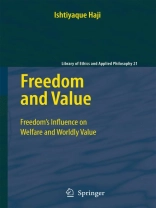Freedom of the sort implicated in acting freely or with free will is important to the truth of different sorts of moral judgment, such as judgments of moral responsibility and those of moral obligation. Little thought, however, has been invested into whether appraisals of good or evil presuppose free will. This important topic has not commanded the attention it deserves owing to what is perhaps a prevalent assumption that freedom leaves judgments concerning good and evil largely unaffected. The central aim of this book is to dispute this assumption by arguing for the relevance of free will to the truth of two sorts of such judgment: welfare-ranking judgments or judgments of personal well-being (when is one’s life intrinsically good for the one who lives it?), and world-ranking judgments (when is a possible world intrinsically better than another?). The book also examines free will’s impact on the truth of such judgments for central issues in moral obligation and in the free will debate. This book should be of interest to those working on intrinsic value, personal well-being, moral obligation, and free will.
Table des matières
Introduction: On Welfare and Worldly Value.- Attitudinal Hedonism.- Freedom-Sensitive Versions of Attitudinal Hedonism.- Pleasure, Desert, and Welfare.- Authentic Springs of Action.- Incompatibilism, Compatibilism, Desert, and Value.- Freedom, Obligation, and the Good.- Hard Incompatibilism’s Axiological Costs.- Hard Incompatibilism, Practical Reason, and the Good.- Value, Obligation, and Luck.- Freedom Presuppositions of Preferentism.- Freedom and Whole-Life Satisfaction Theories of Welfare.












